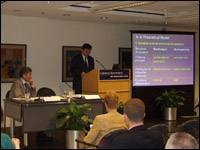Registration
You will receive an email confirming your registration.
IMGXYZ677IMGZYXOn April 24, 2007, the Carnegie Endowment hosted a talk entitled “China’s Health Care Reform: Not Just a Policy Failure,” with Yanzhong Huang, an assistant professor at the John Whitehead School of Diplomacy and International Relations, Seton Hall University. Carnegie Senior Associate Minxin Pei moderated the discussion.
China’s health care reform began in the early 1980s, but the reform has failed to improve the cost, access, and equalities of the healthcare system. Internal government reports blamed the policy for the failure of the reforms, saying it made healthcare too commercialized and marketized. However, Huang argued that this understanding was too simplistic, failing to capture the complexities of China’s health policy process. Other experts, such as Wang Shaoguang, argue that the lack of government commitment is the primary reason for the healthcare reform failure. This lack of commitment, however, is a variable that needs to be explained. Therefore, Huang asks why is the government unwilling or incapable of shouldering its responsibilities in the health care sector?
To answer this question, Huang looked at three structural dimensions, ordering principle, distribution of influential resources, and functional differentiation in comparing bandwagoning to buck-passing polities. Different policies create different incentive structures and therefore have implications for policy outcome. In bandwagoning politics, functional differentiation is low, power concentration is high, and, because of the game’s zero-sum nature, there are high stakes of defeat. The bandwagoning polity facilitated the implementation of Mao’s healthcare policy. Because this policy structure was highly politicized, it won the support of all who wanted to show their support to Mao. Healthcare under Mao made some significant gains; it increased healthcare accessibility to the countryside, thereby decreasing the rural-urban gap. The pitfalls of the system were serious, however; the quality was poor, equality was achieved at the expense of efficiency, people abused the system, and because it was financial overburdened, and it faced a sustainability problem.
The post-Mao era healthcare reforms can be characterized as buck-passing, where functional differentiation is high, power concentration is low, and the ordering principle is non-zero sum (which means that the losers can be invited to replay the game). The death of Mao removed healthcare as a sensitive political issue, but the economic approach of Deng Xiaoping removed healthcare from the national agenda. In addition, the bureaucratic and fiscal decentralization shifted the locus of policy making, giving the Minister of Health a role in the policy-making process. In the post-Mao era, state cadres were disaggregated into separate sectors and the reforms lead to the establishment of independent administrative capacities, new regulatory ministries, and more departments in the Ministry of Health (eighteen ministries currently have a stake in healthcare). These changes reduced the risks of defeat, increased the ways for political advancement, and therefore encouraged policy entrepreneurship. With GDP as a yardstick for cadre performance, however, local officials had little incentive to invest in the healthcare system.
In short, the buck-passing polity has resulted in the central government shaking off its responsibilities of health policy formulation and public health financing. Furthermore, local governments have had little incentive to promote local healthcare and the Ministry of Health ignored its responsibilities in promoting rural health and, in modernizing the health sector, the Ministry tended to shift the financial burden to others, recommending that healthcare be funded through various channels. As a result, the rural health system collapsed, rural-urban gap expanded, regional gap in health resources distribution increased, and resources have been concentrated in large urban hospitals, which exacerbates the problems of access. Rural public health units have turned to drug sales to increase their revenues because they are not receiving adequate resources from the center. Also, healthcare costs have increased greatly, while the disposable income per household has increased by much less; this means that the burden of paying for rising healthcare is falling more and more on the consumers. In United States, 14 percent of costs are out of pocket, in China the figure is over 50 percent, partially because over 70 percent of the Chinese people have no health insurance.
According to a 2006 survey, 49 percent of the Chinese people refuse to see a doctor when ill and 30 percent refuse to go the hospital due to the high costs; because of this, many have died at home. As a result of the severity of this problem, healthcare has moved up to become a top agenda item for China’s top leaders. The central government has increased its spending on health by over 85 percent, but the increase in national income alone could cover all of national healthcare spending. In short, China could afford a national primary healthcare system; the State Council has approved this in principle to be in place by 2010. In an attempt to fix the system, the government has also proposed a social medical insurance system which includes both an urban and rural insurance system. The last components of the government policy to fix healthcare are improved hospital and drug management.
However, according to Huang, the failure of China’s healthcare system was not due to marketization and commercialization, but instead due to a shift to a buck-passing polity. The current policy shift is commendable, but is unlikely to resolve the problems of accessible, affordable, equitable, and quality healthcare. This is because the four aforementioned reforms do not affect the buck-passing polity, which is the root cause of the healthcare systems problems; the health policy process is still captured by special interest groups; there is still widespread dispersion of policy resources, causing public financing and coordination problems; lastly, the bureaucratic incentive structure has not been addressed by these reforms.
This summary was prepared by Oriana Skylar Mastro, Junior Fellow in Carnegie's China Program.
